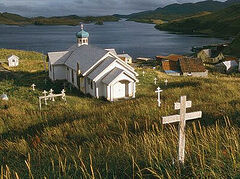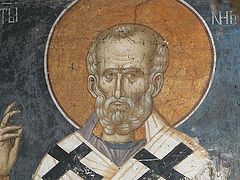 Photo: days.pravoslavie.ru Every time the Holy Church celebrates the memory of a holy hierarch, it presents Christ’s Beatitudes to us in the Gospel reading during the Liturgy. And this is what I would like to draw your attention to today, beloved brothers and sisters in Christ, on the feast of St. Nicholas the Wonderworker: Why does the Lord bless spiritual poverty, i.e. humility, at the beginning of these sayings?
Photo: days.pravoslavie.ru Every time the Holy Church celebrates the memory of a holy hierarch, it presents Christ’s Beatitudes to us in the Gospel reading during the Liturgy. And this is what I would like to draw your attention to today, beloved brothers and sisters in Christ, on the feast of St. Nicholas the Wonderworker: Why does the Lord bless spiritual poverty, i.e. humility, at the beginning of these sayings?
The answer to this question is found in the words of the troparion to St. Nicholas: “Thou hast attained the heights through humility, and riches through poverty.” From these words it’s clear that the height of the moral Christian life and all the richness of the grace of the Holy Spirit is acquired by humility. It’s the basis of our salvation. From this it’s clear why the Lord laid the beatitude about humility as the foundation for all His Beatitudes.
Without humility, it’s impossible to weep for our sins; for how will a proud man weep for his sins when he isn’t aware of these sins in himself, when he always justifies himself and accuses others? Without humility, it’s impossible to be meek, for a proud man doesn’t forgive insults. Without humility, it’s impossible to hunger and thirst for the truth of Christ, for a proud man hungers and thirsts only for everyone to consider his own views as the truth, even if they’re false. Without humility, it’s impossible to be merciful, for proud people are cruel-hearted. Without humility, it’s impossible to have a pure heart, for pride is the vessel for all ungodliness and vices. Without humility, it’s impossible to be a peacemaker, for pride not only doesn’t contribute to peace, but it is the source of malice, hostility, and all kinds of turmoil among people. Without humility, it’s impossible to undertake the podvig of being persecuted for the truth of Christ; and even more so is it impossible to endure reproaches, exile, and any slander for the sake of Christ, for the proud man can be persecuted and endure all misfortunes, all the way up to death—but only for the sake of his pride.
Thus, without humility, it’s impossible to take even a single step towards accomplishing a truly Christian good deed, which, being based on humility, is accompanied by and distinguished by it as its most characteristic feature. The Lord testified to this truth in His Sermon on the Mount, not only by setting forth the Beatitude about humility first, but also by His words in which He commanded us to secretly do alms, prayer, and fasting and to do good deeds such that our left hand doesn’t know what our right hand is doing (Mt. 6:3). This is why the saints, those true disciples of Christ, tried to conceal their good deeds from others. Once, St. Poemen the Great was asked which virtue is the highest. He said: “That which is done in secret.”
Bearing in mind Christ’s teaching about the significance of humility for the Christian life, knowing that the virtuous life of the saints was imbued with humility and distinguished by it as its most essential property, let us also endeavor, beloved, to have humility, without which we’ll never become true Christians.
Of course, acquiring humility is the most difficult of all podvigs. Often, even the Lord Himself, sending us great trials and tribulations, can’t force us to be humble. This we know, beloved children in Christ, by our own life experience. However, without humility, we’ll never attain salvation. Therefore, let us try to acquire it at least at first in its simplest and original form; i.e., let us be aware of our sinfulness and nothingness before God. Of course, it’s no great merit to be aware of our sins before God when they’re so obvious to us and to others. But if we acquire this initial humility, then we also draw near to its highest form, which consists in considering ourselves worse than others. This humility is highly valuable in the eyes of God. This is why the Lord said: Every one that exalteth himself shall be abased (Lk. 18:14).
Only having reached such a degree of humility will we be able to acquire its highest and most perfect form, which consists in ascribing all our good deeds not to our own efforts but to God; and together with the Divine Psalmist, say from the bottom of our hearts: Not to us, O Lord, not to us, but to Thy Name give glory, because of Thy mercy and Thy truth (Ps. 113:9). Then we’ll be able to fulfill all the Divine commandments perfectly. Let us recall the words of the Apostle Paul: I can do all things through Christ Which strengtheneth me (Phil. 4:13). These words tell us that with the help of God, we can perform even the most difficult podvig—that is, acquire true, perfect humility.
Therefore, let us ask the Lord that He might help us, through the prayers of the saints and the Holy Hierarch Nicholas now being celebrated by the Church, to acquire this great, fundamental virtue. When we acquire humility, then we’ll know by our own experience why the Lord placed the Beatitude about spiritual poverty first. Then we’ll become true followers of Christ, bearers of every Christian virtue, and the words of Christ will be fulfilled in our lives: Let your light so shine before men, that they may see your good works, and glorify your Father Which is in Heaven (Mt. 5:16).
Amen.
Delivered in the Russian Church of St. Nicholas in Sofia, Bulgaria, on December 6, 1925.



